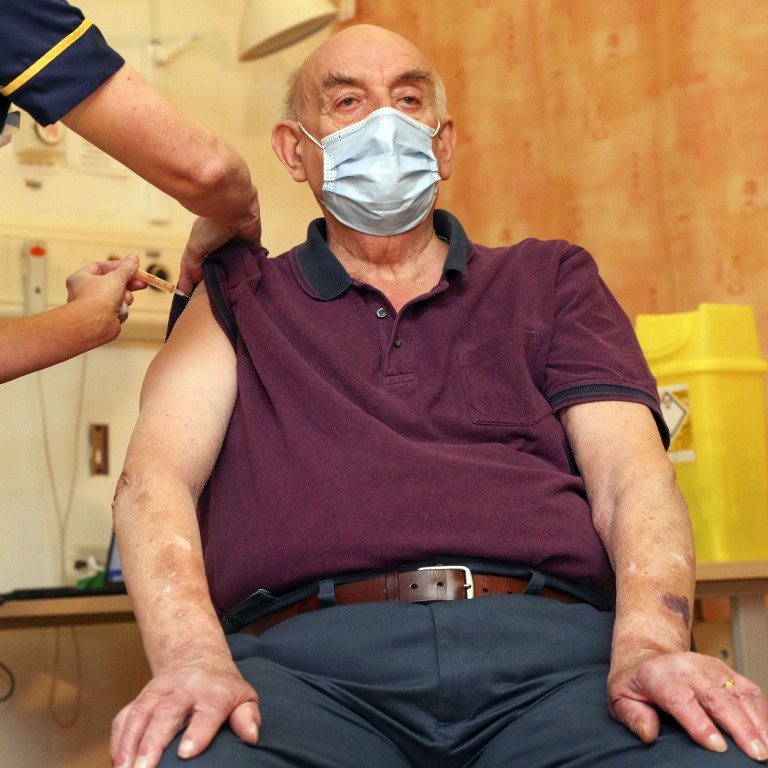
Coronavirus: UK rolls out Oxford-AstraZeneca vaccine but new strains are cause for ‘incredible worry’
- The vaccine is seen as a game-changer by many experts because it does not require very cold temperatures for storage
- However, scientists are reportedly concerned that vaccines may not work on a new variant of the coronavirus found in South Africa
The vaccine, developed by AstraZeneca and the University of Oxford, is seen as a game-changer by many experts because it does not require very cold temperatures for storage like the ones from Pfizer-BioNTech and Moderna.
That could mean greater access to the vaccine for less wealthy parts of the world in the fight against the coronavirus, which has infected nearly 85 million people with more than 1.8 million known deaths.
Brian Pinker, an 82-year-old retired maintenance manager, received the first jab at Oxford’s Churchill Hospital, NHS England said.
“I’m very pleased that I got the Oxford vaccine,” he said, adding that it was a “no-brainer” to get the shot.
British Health Secretary Matt Hancock tweeted that he was “delighted that today we roll out the @UniofOxford / @AstraZeneca vaccine across the whole UK.”
“It’s a vital step in our fight against this pandemic,” he said.
“We can see the way ahead in terms of a route forward, we can see how we can get out of this. But we do have a tough period ahead,” Prime Minister Boris Johnson said on Sunday.
Britain has already vaccinated around 1 million people after approving the Pfizer vaccine in early December and hopes to give shots to tens of millions in the next three months, Johnson said in a BBC interview.
However, scientists are not fully confident that Covid-19 vaccines will work on a new variant of the coronavirus found in South Africa, ITV’s political editor said on Monday, citing an unidentified scientific adviser to the British government.
Hancock said earlier on Monday that he was incredibly worried about the new variant. Public Health England did not answer phone calls requesting comment on the report.

“According to one of the government’s scientific advisers, the reason for Matt Hancock’s ‘incredible worry’ about the South African Covid-19 variant is that they are not as confident the vaccines will be as effective against it as they are for the UK’s variant,” ITV political editor Robert Peston said.
Both Britain and South Africa have discovered new variants in the coronavirus in recent months that have driven a surge in case numbers.
The new coronavirus variant that emerged in Britain is more transmissible and appears to affect a higher proportion of people under 20, according to a report from Imperial College London and other science groups.
The mutation of concern has “a substantial transmission advantage” and is linked to “epidemic growth in nearly all areas”, the scientists wrote. It can raise the virus’s reproduction rate, which indicates how many people one patient infects, by as much as 0.7, the researchers found.
“This will make control more difficult and further accentuates the urgency of rolling out vaccination as quickly as possible,” said Neil Ferguson, a professor at Imperial who has worked on modelling the outbreak.
Scientists also say the new South African variant is different from others circulating in the country because it has multiple mutations in the important “spike” protein that the virus uses to infect human cells.
It has also been associated with a higher viral load, meaning a higher concentration of virus particles in patients’ bodies, possibly contributing to higher levels of transmission.
John Bell, regius professor of medicine at University of Oxford who sits on the government’s vaccine task force, said on Sunday he thought vaccines would work on the British variant but said there was a “big question mark” about whether it would work on the South African variant.
He told Times Radio that if the vaccine did not work on the South African variant the shots could be adapted and that would not take a year.
“It might take a month or six weeks to get a new vaccine,” he said.
Additional reporting by Reuters, Bloomberg

.png?itok=arIb17P0)